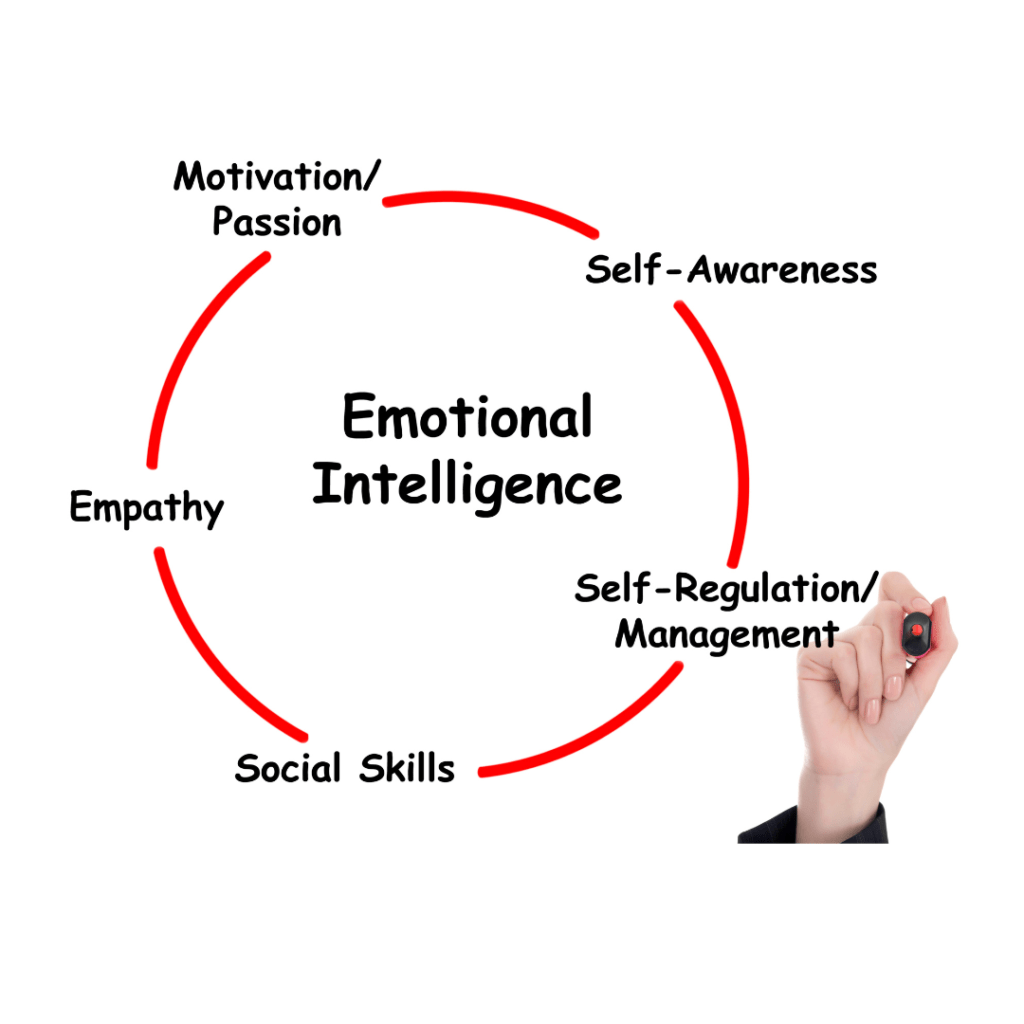Some people are born with a higher degree of emotional intelligence. However, anyone can learn it by conducting emotional intelligence training.
Most people believe that people with an excellent intelligent quotient are successful in their lives, and they assume IQ is the factor that determines the long-term success/performance of a person in both their personal and professional life; however, researchers found that 70 % of the time people with low IQ are outperformed those with high intelligent quotient.
The reason behind this is Emotional intelligence; the missing link that determines a person’s long-term performance/success is emotional intelligence. After many types of research and studies, it is scientifically proven that People with high emotional intelligence always perform ahead of those who are good at IQ.
To know how exactly emotional intelligence plays a vital role in the intelligent quotient in a person’s life, first, we have to comprehend the concept of emotional intelligence and the primary functions of its main components.

What is emotional intelligence?
They induce that Emotional intelligence is the critical factor determining a person’s long-term success. The term emotional intelligence was created by researchers John D Mayor of UNH, and Peter Salovey of Yale. It was then made famous to the masses in the mid-90s by the book called emotional intelligence written by Daniel Goleman.
Emotional intelligence is most often defined as the ability to recognize, understand, perceive, control, and evaluate emotions. (Own emotions and others’ emotions).
Emotional intelligence (EI) has two major components which play a prime role, Intrapersonal skills [personal competencies] and Interpersonal skills [social competencies].
Intrapersonal intelligence:
Intrapersonal skills are described as Personal competencies. People with good intrapersonal skills can manage and redirect themselves and their behaviours. We can be aware of our moods, emotions and motives. Intrapersonal intelligence also requires flexibility, thinking before reacting, being open to change and knowing how our feelings affect others.
Intrapersonal skills matter a lot because it helps you to continually reflect, regulate and evaluate your inner feelings and, through reflection and find ways to enrich both your personal and professional lives.
“When you control your thoughts and emotions, you control everything.”
~Marshall Sylver.
Interpersonal intelligence:
Interpersonal intelligence is comprised of our social awareness and ability to manage our relationships. It is the ability to understand others’ moods, behaviours, and motives. Understanding is the core of the issue. Interpersonal intelligence builds an ability to manage and influence others’ emotions and interact successfully by empathizing with people and reacting and treating them according to their reactions.
Interpersonal skills help people build rapport, find common ground and connect with others. About 80% of communication is non-verbal so having an ability to read others’ actions gives us a better understanding of their thoughts and feelings.
“You can be successful in your life, but a Legacy requires that you have other people with you. And not the kind of people who may be in your league now. You want people to find you who are out of your league and in their areas and domains like there is no chance for someone with your credentials to work with that person. Except for the fact that they are, for whatever reasons, drawn to and attracted to you. When people like that find you, they take you from where you are and allow you 10X 100X very rapidly, and that’s not going to happen because you go and convince them it’s going to happen when they find something in you, and then they come after you and come to you.”
~ Antano Solar John
Is emotional intelligence fixed/ born skills?
Some people are born with a higher degree of emotional intelligence however, anyone can learn it by conducting emotional intelligence training and developing higher emotional intelligence throughout their lives.
Emotional intelligence can be developed over some time. For that, we should learn to know more about our own emotions and how they work. We should learn how to control our own emotions. We should develop an awareness of our own emotions. So many people are being struggled with being overwhelmed by life stress and being carried away by negative thoughts and responses. We are feeling socially awkward, feeling stuck with facing challenges and having trouble with relationships.
To allow us to learn and integrate emotional intelligence skills is brain plasticity. Brain plasticity is the ability of the brain to change and adapt by growing new nerve connections. We lose half of our brain, and with training and treatment, the other half of our brain can rewire itself to establish most of the abilities that were lost.
EQ is like our muscle. The more we use the skill, the more it will develop. Rewiring our brain takes time and our ability to learn new skills repeatedly. Developing our EQ requires communication between two parts of our brain: The limbic system (emotional centre) and the prefrontal cortex (rational thinking centre).

“Talent you have naturally. Skill is only developed by hours and hours and hours of beating on your craft.”
~Will Smith
Emotional intelligence in the corporate world:
Well, in this modern era, the contemporary workplace is pictured with certain qualities, which include open communication, teamwork, mutual respect among employees and their supervisors etc. furthermore, emotionally intelligent people quickly build trust and respect with others.
Emotional intelligence is most commonly recognized as a valuable skill. It helps improve communication, behave the way they do and enhance their involvement with and performance at work. Identifying and managing your emotions and empathizing with others is an essential business skill.
Emotional intelligence influences everyday tasks in both personal lives and business. 70 % of the time, people with low IQ outperform those with high intelligence quotient. Sales representatives with high emotional intelligence outperformed others by 50%. People with high EQ have a higher level of productivity. For instance, a study of over fortune 500 companies found that the programmers with high EQ produce software three times faster than others.
Key elements and Benefits of emotional intelligence:
An American psychologist, Daniel Goleman, claims that emotional intelligence has five key components:
Ø Self-awareness.
Ø Self-regulation.
Ø Motivation.
Ø Empathy.
Ø Social skills.
The enhancement of employees’ confidence levels, ensuring that they can work more efficiently, is attained with the help of Emotional Intelligence and its concepts of self-awareness and self-management. When they understand their emotions, they can manage expectations more productively and assist others in dealing with similar issues.
The benefits of conducting emotional intelligence training:
Emotional intelligence training help employees upgrade to the Next Level job
By being emotionally intelligent, you can reduce stress, and organizations get fewer conflicts in the workplace.
Emotional intelligence training train employees to response in critical situations
Its helps employees to be more self-aware and Conquer,Fears, Doubts, and Insecurities.
Emotional intelligence training enhances social skills.
Emotional intelligence training helps in creating positive environment in the workforce.
In conclusion, Emotional intelligence training is essential for all employees, from the beginning to those in charge. Most importantly, it is even more critical for leaders.
“Emotional intelligence can be the game changer to high performance and personal leadership.”
~Steve Gutzler





Leave a Reply